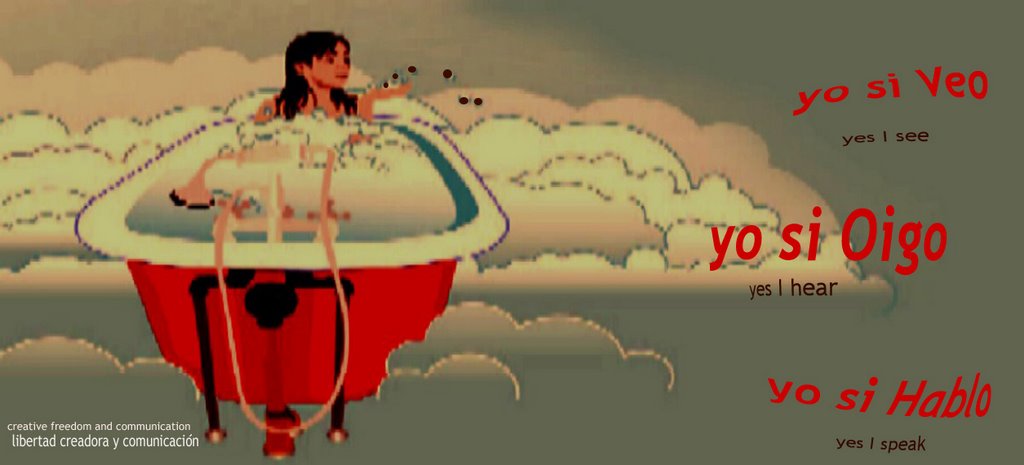 Anna Baltzer, a young Jewish American scholar, presented yesterday "Life in Occupied Palestina: Eyewitness Stories & Photos" at the University of Missouri-Columbia. A presentation on her personal experience as volunteer in this land for five months with the International Women's Peace Service, a human rights organization based in the Occupied Palestinian Territories. Anna Baltzer, a young Jewish American scholar, presented yesterday "Life in Occupied Palestina: Eyewitness Stories & Photos" at the University of Missouri-Columbia. A presentation on her personal experience as volunteer in this land for five months with the International Women's Peace Service, a human rights organization based in the Occupied Palestinian Territories.
Working with Palestinians and Israelis in nonviolent resistance to the Occupation, she provide us with critical information and documentation that can be difficult to obtain through mainstream Western media sources. Instead of historical views -that could be interesting but not too motivating-, Anna Blatzer tell us real histories of the common people, where we can find the terrible consecuences of the conflict in their actual and daily life, encouraging people to take action on the issue.
This activist woman is going to be bringing more presentations in the next days around U.S.A and I invite you to hear her strong, emotive and honest speaking and see her toughful photographs, that will make you discover a new side of the conflict and feel much more near to it than any other thing, unless you check it out and speak by yourself.
The following is a summary of the conference.
(Source: Synopsis and photos yielded by Anna Baltzer).
Life in Occupied Palestine: Eyewitness Stories & Photos
Facts, Sources, and Ways You Can Help
FACTS:
Killed since the beginning of the Second Intifada: 995 Jewish Israelis, 3843 Palestinians (MEPC, 2006; for up-to-date statistics: www.mepc.org/resources/mrates.asp)
Checkpoints: Barriers manned bu soldiers or border police used to control Palestinian pedestrian and vehicle acces. Checkpoints are not only near the Green Line (the internationally-recognized border between Israel and the Palestinian Territories) but mainly between Palestinian towns and villages. There can be hundreds of flying checkpoints anywhere and anytime as well. Most checkpoints are closed overnight, blocking sick or pregnant villagers from getting to a hospital in emergencies.
Roadblocks: One meter-high concrete blocks or piles of rubble, dirt, or rocks used to prevent Palestinians from driving their vehicles on their roads.
Settlements: Jewish Israeli colonies on internationally-recognized Palestinian land.
- International law prohibits an occupying power from transferring citizens from its own territory to the occupied territory (Fourth Geneva Convention, Article 49).
- There are currently about 430.000 settlers living on illegaly occupied or annexed Palestinian land (240.000 in the West Bank and 190.000 in East Jerusalem). In 2005, 8.000 settlers were evacuated from Gaza and 13.000 new settlers moved into other new or expanding settlements.
- 80% of settlers are primarily motivated by financial benefits provided by the government, such as tax breaks and housing subsidies. 74% of settlers would be willing to leave the Occupied Territories if offered compensation, but Israel spends more than $400 million a year encouraging more citizens to move to the settlements, and $1 billion more to protect and expand them.

The Wall: - If the Wall is completed as expected, 34,4% of Palestinians will be separated from each other or from their land, and Israel will annex approximately 15% of the West Bank, including 60-80% of the region's most fertile and water resources.
- 80% of the Wall doesn't touch the Green Line, rather it cuts into the West Bank, trapping 274,000 Palestinians between the Wall and the 1967 border. About half of the trapped communities are expected to be completely surrounded by the Wall (UN OCHA).
- More than 120,000 Palestinian olive trees have been uprooted so far. 35,000 meters of water infraestructure have been destroyed by bulldozers working on the Wall.
Prision: - Over 340 Palestinian children are being held in Israeli prisons or detention centers, mostly for alleged stone-throwing. Over 1,000 kids have been arrested since September 2000.
- More than 8,300 Palestinian political prisoners are being held in Israel prisons, including about 840 administrative detainees, who can be held without charge indefinitely (Addameer, 2005).
SOURCES of Facts and More Information: www.alternativenews.org - AIC, Alternative Information Center
www.btselem.org - B'tselem, Israeli Information Center for Human Rights in the Occupied Territories.
www.fmep.org - FMEP, Foundation for Middle East Peace
www.palestinemonitor.org - Palestine Monitor, News from Palestinian Civil Society
www.gush-shalom.org - Gush Shalom, the Israeli Peace Bloc
www.stopthewall.org - PENGON HOW CAN YOU HELP BRING PEACE AND JUSTICE TO PALESTINE AND ISRAEL: - Go to Palestine, or support someone who is. Just being there in solidarity and communicating your experiences to people back at home is one of the strongest statements you can make. Volunteers and interns are needed in: International Women's Peace Service; International Solidarity Movement; Campagne Civile Internationale pour la Protection du Peuple Palestinien. If you want to see for yourself the situation, you can contact with the following organizations that gives tours of the Palestinian territories: Birthright Unplugged (www.birthrightunplugged.org); Holy Land Trust (http://hlttravel.org); Israeli Committee Against House Demolitions (www.icahd.org).
- Get involved locally.
- Protest against giving taxes to Israel for activities beyond the Green Line, whether to build a Wall. to move more settlers in, or to conduct military operations.
- Talk about this to your friends and families.
Visit Anna's Website (you will find more information, photos ..., and you could buy her book "Witness in Palestine" or a DVD of the presentation): www.annainthemiddleeast.com
|


